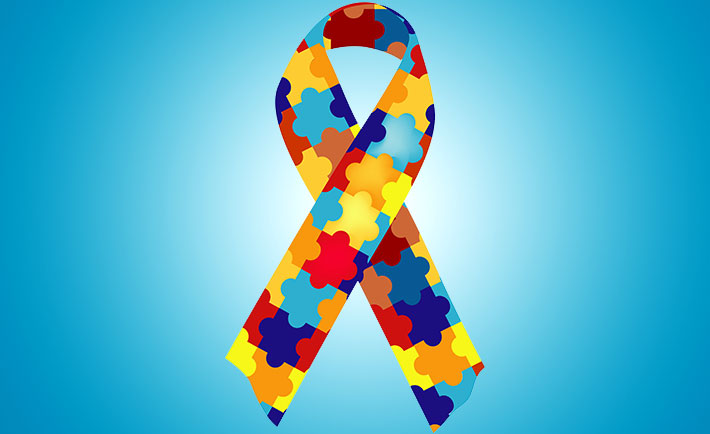Autism awareness encourages the community and members with autism to become partners in a movement towards acceptance and appreciation. It helps provide each person with ASD (Autism Spectrum Disorder) the opportunity to achieve the highest possible quality of life. It’s about self-identity, acceptance and appreciation for how each one of us does our part to make the world a better place for those with autism.
Here are some things you could do to get the ball rolling on autism awareness.
Autism Awareness Ribbon
The Autism Awareness Puzzle Ribbon is the most enduring and recognized symbol of the autism community in the world. It was adopted in 1999 as the universal sign for autism. The puzzle pattern reflects the complexity of the autism spectrum. The different colors and shapes represent the diversity of people and families living with the condition.
The brightness of the ribbon signals hope – through increased awareness of autism, early intervention and access to appropriate services/support, people with autism will be able to lead fuller lives and be able to interact with the world on their own terms. It symbolizes the belief that we are not alone, but all part of the great puzzle of life. Even though we are different, we all belong and are needed.
Show your support for people with autism by wearing the Autism Awareness Puzzle Ribbon – as a pin on your shirt, a magnet on your car a badge on your blog, or even your profile picture – and educate others on the potential of people with autism.
Connect with your community:
Many centers hold special events in their communities throughout the month of April. But if you can’t find one that suits you, create your own.
 Autism Awareness Event will take place at Saudia Airlines Club on Thursday, April 2nd, from 5 pm to 9 pm. It’s a day of fun activities for kids and families with autism.
Autism Awareness Event will take place at Saudia Airlines Club on Thursday, April 2nd, from 5 pm to 9 pm. It’s a day of fun activities for kids and families with autism.
After a suggestion from the Global Shapers Community, the Psychology club at Effat University is working on an autism event in the second half of April. President of the club Salwa Bashammakh says “The main goals of the event is to increase public awareness on autism, and to replace the negative perception society may have about autistic people with a more positive, healthy one.”
“The event will be targeting Arabic-speaking females in the society; and plans to expand the awareness to those who cannot attend” she adds.
Donate to societies working with Autism:
Help improve the lives of people impacted with autism with a financial gift to the Autism Society.
Facts & Statistics:
- Autism’s estimated prevalence has skyrocketed in the past ten years. Today it’s 1 in 68.
- Autism can be reliably diagnosed by age two. Early intervention improves outcomes. High-quality early intervention does more than develop skills. It can change underlying brain development and activity. It is also cost effective as it reduces the need for educational and behavioral support in grade school and beyond.
- One third of children and adults with autism are nonverbal.
- Research by the Autism Speaks ATN revealed that half of the children with autism have GI disorders and the pain can worsen behavioral symptoms.
- Autism-related sleep disturbance is common and treatable.
- There are medical guidelines and tool kits to help parents improve the sleep of those with autism.
- As many as one third of individuals with autism have epilepsy. However, the potentially dangerous seizures are not always obvious without specialized testing.
- Autism can affect the whole body: Seizures, disturbed sleep and painful GI disorders are just some of the medical conditions commonly associated with autism.
- Most adults with autism (84%) remain living with their parents.
- Nearly half of 25-year olds with autism have never held a paying job.
Signs & Symptoms:
From birth to 5 years, your child should reach milestones in how he plays, learns, speaks, acts, and moves. Track your child’s development and act early.
The National Institute of Child Health and Human Development (NICHD) lists five behaviors that warrant further evaluation:
- Does not babble or coo by 12 months
- Does not gesture (point, wave, grasp) by 12 months
- Does not say single words by 16 months
- Does not say two-word phrases on his or her own by 24 months
- Has any loss of any language or social skill at any age
Any of these five “red flags” does not mean your child has autism. But because the disorder’s symptoms vary so widely, a child showing these behaviors should be evaluated by a multidisciplinary team.
[Check out this link for more signs and symptoms.]
At the end of the day, more than anything what we hope is to create an opportunity to educate the world on autism and help better our community. No matter what you can do on April 2nd and throughout Autism Awareness Month in April, we hope that you will help us shine a light on all of those individuals affected by autism out there!










